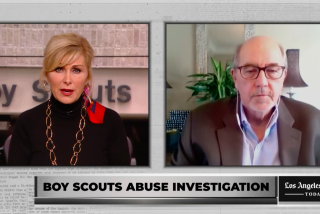Sometimes Work Must Take a Back Seat to Emotion
- Share via
Some stories are easily reported and written. Others take more time and more effort.
Then there are stories that involve more than effort and time. They are the ones that take an emotional toll. When I first started working on a profile about Holly Keuthan, a 6-year-old stricken with cancer, I knew its effect on me would be unlike any of the stories that normally come up on my education beat.
Reporters try not to get too close to the subjects of their stories. Sometimes it’s the only way we can write a balanced account. Emotion, after all, can cloud the facts and distort the story. I usually find it an easy rule to follow.
I started reporting on the Keuthan family’s struggle in the spring and vowed not to get emotionally involved. But this story drew feelings that I have always sidestepped in my job. There was fear, anger and joy. When it was time to write in September, I was shaken. This little girl and her family had gotten to me.
It was not easy to create a three-day series on what this family went through while fighting for her survival. This was a story about a little girl I truly liked. And most painful of all, I had no idea whether she would be alive by the time the series ran. That thought alone terrified me.
I first met Holly last year at Children’s Hospital of Orange County while reporting an education story on classes given in the hospital for children with long-term illnesses. Holly was sitting at a desk learning math on a personal computer. She was just starting to lose her hair to chemotherapy treatments. With one delicate hand under her chin and the other pounding the keyboard, she looked like a little math whiz.
Her mom, Karen, sat nearby watching her every move--it was as if by not taking her eyes from her daughter, Karen could protect her from harm. It was something I saw often during my time with the family. She talked about her daughter’s tutoring and about Holly’s condition, and about their hopes for an intensive cancer treatment that held the promise of tripling Holly’s chance for survival.
Shortly after that--when Holly had returned home--Karen and her husband, Jan, agreed to let Times photographer Lacy Atkins and me record the family’s experiences that summer while Holly underwent the six-week cancer treatment. Before the treatment began, I started my reporting.
At that point, a medical crisis struck. Holly became ill in June and nearly died from a bout with blood infection. Lacy learned about Holly’s condition and went to my desk to tell me. I was on the phone in the middle of a conversation with a source who is difficult to reach. She scribbled down that Holly was in intensive care and was in bad shape. My telephone conversation didn’t seem as relevant any more. I felt utterly helpless.
As reporters, we tend to swoop down on people’s lives, gather the news and take off. Most of the time we never meet the same people again. That was not so here. I had learned a lot about the Keuthans--their hopes, their worst moments, their fears. But I could not imagine the pain Karen and Jan were enduring at that point.
I wondered: When do you stop being a reporter and become just an ordinary person, listening to somebody’s else pain? Quite frankly, I didn’t know.
Holly managed to survive that crisis and even a second bout of septic shock before she re-entered the hospital for the bone marrow transplant.
During that time, I talked often with the family. One interview with Karen took place in the rose garden outside the hospital. She took a moment while Holly was in the hospital playroom. We talked about Scott, Holly’s 7-year-old brother, and how he once screeched along the rose garden in his roller blades.
I had my tape recorder and a notebook. While she talked, I busily scribbled notes and turned on the recorder to capture the best quotes. Questions were fairly routine: How was Holly? How was the family holding up? What did the doctors say?
Karen tried to keep the answers succinct. She explained what she was feeling and the way her daughter was reacting to the treatment. As the conversation continued, we talked about the possibility that the cancer treatment could fail. Worse--what if Holly dies?
The conversation stopped.
Karen was crying. I had never seen her cry. She had always been strong. I stared at my hands, my feet and my notebook. Words would not suffice. There was simply nothing I could say.
I turned off my tape recorder and hugged her. We sat in that rose garden while she just cried. I guess at that moment I was just ordinary person listening to somebody’s pain. I would be a reporter another day.
(Holly survived the intense radiation and the long hospital stays. She is now doing very well, her cancer apparently in remission. She spent Christmas at home with her family.)
More to Read
The complete guide to home viewing
Get Screen Gab for everything about the TV shows and streaming movies everyone’s talking about.
You may occasionally receive promotional content from the Los Angeles Times.






